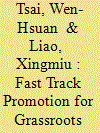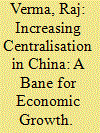| Srl | Item |
| 1 |
ID:
184754


|
|
|
|
|
| Summary/Abstract |
Although the “selected graduate” (xuandiaosheng) system is not new, Xi Jinping has changed it substantially since he came to power. This paper introduces the concept of the “promotion ladder” to describe how low-ranking cadres must wait longer for promotion than do mid- and high-ranking cadres. This promotion ladder often leads to low-ranking cadres hitting a ceiling in their careers. For this reason, section-level cadres need a fast track that will allow them to “sprint with small steps” (xiaobu kuaipao) if they are to make significant progress in their careers. The xuandiaosheng system not only works as an important means for accelerating the promotion of grassroots cadres but also allows cadre management to start as soon as a prospective cadre graduates from a university. The system introduces flexibility into the Chinese Communist Party’s (CCP’s) cadre system, allowing it to cope with the constraints of the promotion ladder. This paper will summarize the operation of the xuandiaosheng system under Xi Jinping and discuss its advantages and disadvantages as well as its likely influence on CCP elite politics in the future.
|
|
|
|
|
|
|
|
|
|
|
|
|
|
|
|
| 2 |
ID:
188679


|
|
|
|
|
| Summary/Abstract |
This article contends that increasing centralisation of decision-making in China will undermine the country’s future economic growth. It highlights the declining role of private enterprises and the increasing role of state-owned enterprises (SOEs) in the economy, and the extension of Communist Party influence in both SOEs and the private sector through the Party’s Organization Department and United Front Work Department. It argues that the increasing role of the state in the economy over the past decade has stifled growth through a decline in ‘total factor productivity’ because of increasing misallocation of resources. Centralisation, with associated losses in efficiency, objectivity, agility, speed and finesse regarding allocations of risks and investment, has debilitated decentralised decision-making and reduced the incentives for undertaking risks and innovation. The article argues that increasing Party control over the SOEs and the private sector will negatively impact the corporate structure and management decisions, exacerbate the fundamental problems of corporate governance and limit or hamper innovation.
|
|
|
|
|
|
|
|
|
|
|
|
|
|
|
|